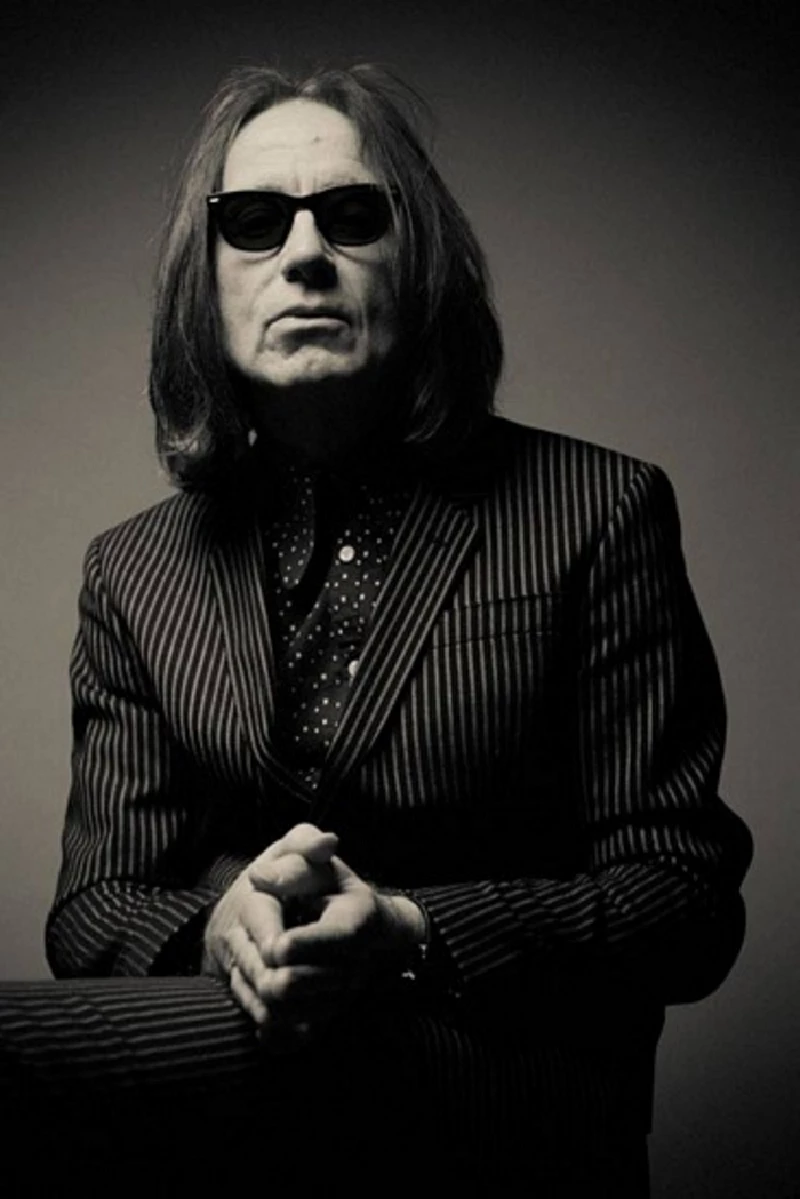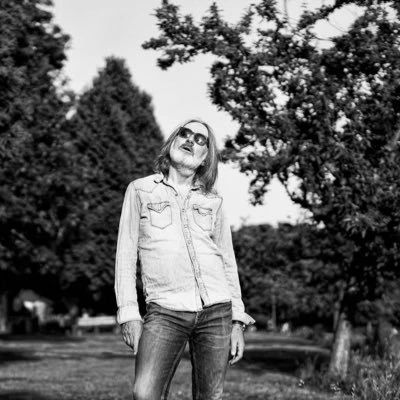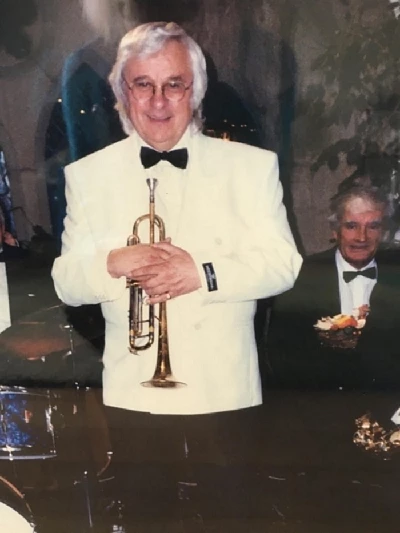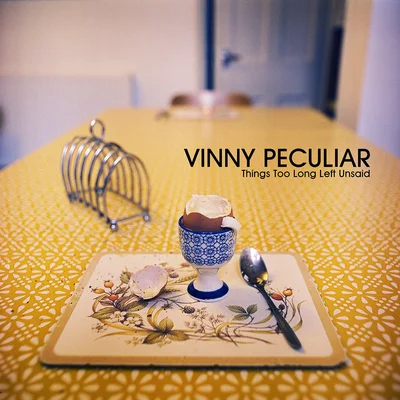Vinny Peculiar - Interview
by John Clarkson
published: 16 / 6 / 2016

intro
Singer-songwriter Vinny Peculiar talks to John Clarkson about his new concept album, 'Silver Meadows', which was inspired by his experiences working in various long-stay mental health hospitals during the 1980s and 1990s
There has always been a rich vein of autobiography to the English singer-songwriter’s Vinny Peculiar’s work. Whether telling of losing the girlfriend of his teenage years to Christianity in ‘Jesus Stole My Girlfriend’, or his guilt at leaving his then young daughter behind on ‘Flatter and Deceive’ while he went off on tour, or of the funeral of his much loved musician uncle and muse on what is possibly his masterpiece ‘And Soon the Darkness’, Peculiar has always filled his lyrics with true and not-so-true confessions. A veteran of a dozen albums, Peculiar, a former mental health nurse, has touched upon the issue of mental health care in the past, reflecting on a particularly strange day at work in ‘A Visitation’, and writing wistfully on ‘English Village’, the opening track of his last album ‘Down a Peculiar Stream,’ of his idyllic 70’s childhood being brought to an end by his schizophrenic older brother’s psychological collapse. Peculiar, who will be playing two Pennyblackmusic shows in Glasgow on September 22nd and in Edinburgh on September 23rd, has now produced his first concept record, ‘Silver Meadows’, which sub-titled ‘Fables from the Institution’, tells of an imaginary mental institution, and was inspired by his experiences both visiting his brother and working in various long-stay mental health hospitals during the 1980s and 1990s. As always, with Peculiarhis songs are character-dominated, and his narrative tales capture the paradoxes and both the unpredictability and the regimental routine of being either a patient or a member of staff in them. On the piano-led opener ‘The Institution’, Rick, the car-loving charge nurse, maintains control over the patients by beating them up. Andy Merritt, the protagonist of ‘The Saviour of Challenging Behaviour’, tries to break down the patterns of decades and introduce a serious of changes. He is forced to leave, but his kindliness and liberating spirit is remembered long after he is gone by his patients. On 'Hospital Wing' a young man with a degenerative condition slowly fades away like his brother did in the same ward a few years before. The narrator of the title track returns contentedly to Silver Meadows having found himself unable to cope with the outside world, while “restless spirit” ‘Albert’ in contrast manages to temporarily escape before being returned to his ward by six policemen. ‘Gerald the Porter’ deals in and sells drugs to both patients and nursing staff, and two inmates fall in love at the ‘Wednesday Club’ disco before being tragically forced apart. ‘Silver Meadows’ swings musically between pop and folk and soft psychedelia. On the tender penultimate song ‘Waiting Games’, Jason, a seemingly catatonic patient with locked in intelligence, falls for his young psychologist Beth, while the last song, a searing and discordant alternative rock number, tells of the horror of ‘The Back Wards’(“Just settle down and do as you’re told/Or they’ll make you pay on the back wards.”) With a theatre play of it also on its way, Pennyblackmusic spoke to Vinny Peculiar about ‘Silver Meadows’ PB: You have given the album the sub-title of ‘Fables of the Institution’. A fable is a short story with a moral. Do you see the fourteen songs on ‘Silver Meadows’ as essentially morality tales? VP: There is an element of that in some of them. The album as a whole deals with the separate lives that people who have been long-term stays in mental institutions have lead in these places and how excluded they were from the ordinary everyday situations that we all take for granted like relationships and having a job. Each of the songs has its own kind of collection of issues, I suppose. Fables to me, however, are not exclusive truths in their own absolute right. They are impressions, ideas, stories and recollections that may or may not get distorted by the teller. There is an essential truth in all of the stories on ‘Silver Meadows’. For example, ‘Wednesday Club’ is true. It is about a couple who fell in love in hospital but were separated because of the Community Care Act. ‘Gerald the Porter’, however, is not a true story. He is definitely made up, although an element of Gerald was there when I was working in one hospital in particular, but it wasn’t quite as it was presented. There are various other songs that have a kind of truth but they are often composite truths. ‘The Saviour of Challenging Behaviour’ was based on a couple of people that were definitely outside the mainstream in terms of trying to change these places and help people leave and get proper lives,. They took on the establishment and invariably came off worse, but the patients were given by them some kind of long-term inspiration to move on. The vibe in these places was often surprisingly good. PB: It is interesting that you say that the vibe in these places was sometimes good. You have created an often very dark portrait of mental institutions. There are abusive nursing staff, patients are incarcerated far longer than they should be and they are forced to do demeaning tasks for sweets. Yet for all that it doesn’t come across as an especially black album. If you look at some of these songs, such as ‘Waiting Games’ and ‘The Saviour of Challenging Behaviour’, then ‘Silver Meadows’ seems to be equally about the triumph of the human spirit against often impossible odds. Was that your intention? VP: They were dark times, but in any kind of dark and foreboding environment there are elements of positivity and acts of love and kindness. I tried to reflect that as well as the bad stuff. For every bad character, such as the charge nurse Rick who would rather beat up the patients than actually kind of have any dialogue with them, there are other characters that are dispensing love and decency. There is a humour as well in places like these. Everybody is living in such a separate world that they develop their own relationships and humour. It is never all just bleak. There is always hope and things do change PB: On the title track the main character returns gladly to the Institution having found himself not equipped to dealing with the outside world. Did you write that as a deliberate counterbalance to much of what else goes on during the record in which many of the characters either dream of escaping or like ‘Albert’ do actually succeed? VP: Yes, that character is a counterbalance to a lot of the other characters. That guy Jason keeps coming back because the services in the outside community don’t work for him for one reason or the other, and has just got so used to being where he is that he keeps returning time and time again to the Institution. He feels safe and secure there, and that was true for a lot of patients when I was working in mental health care. I think that most of the people that were in that position were eventually relocated out into the community and hopefully had better lives. Jason shows the warm side of the Institution. There were patients there who had all sorts of little jobs around the place. You couldn’t always work out why they were there, but they had become very institutionalised and set in their ways as had the staff, of course. They didn’t want any change either. They just wanted to bumble along. PB: You were going to close the album with ‘Hospital Wing’ but settled instead on ‘The Back Wards’. Why did you decide to close with that instead of ‘Hospital Wing’? VP: 'The Back Wards’ is the most bleak and foreboding of the tracks on the album. These places did exist, less so in the 80s, but abuse has always existed in these places and even then there were these wards which were known as “the Back Wards” where they housed the difficult-to-manage patients and often over-medicated them. There wasn’t a lot of hope there in terms of prognosis and with people moving on. You didn’t want to end up there because there was often no way out of there. They were the dead end of the National Health Service and the health system, so that fitted the end of the album. Hopefully people will go back to the beginning of the album and listen to it again and realise that ‘Silver Meadows’ is not just about that. It did, however, seem to be quite a powerful way to end the album. There is also a huge wall of guitars there and, to use a cliché, it has an “epic-ness” which the other tracks don’t have. PB: You have apparently known David Marsden who produced ‘Silver Meadows’ for years. VP: Yes, indeed. In the early 90s he used to run Pearl Studios in Liverpool in which I used to record. Dave has got a career in music and TV and film soundtracks now. That is what he does most of the time. He doesn’t do many albums but we always said that we would do one together. It took us twenty odd years to get to this point. PB: What do you think he brought to the album? You have always said in the past that your albums are as much about finding the right producers and personnel as well as the right songs. VP: Yeah, it is good when you know you are working with people that get it. Dave has quite a pristine and disciplined approach to sound while I am more of a one take, hope for the best kind of guy. Dave did a lot of fine tuning and editing. He is a really good song and sound organiser, and has added a lushness to ‘Silver Meadows’ which my other material doesn’t have. PB: Who were the other personnel on the record? VP: There is on the drums a Liverpool drummer called Paul Tsanos. Bobby Kewley, who is the bass player, is from Liverpool as well. Everything else was played by Dave and myself. Most of the guitars and mandolins were played by me, and Dave and I split up the keyboards between us. PB: Do you think that the mental health surface is in a better or worse state now than when you worked there? VP: I think that it is systematically getting starved of resources, particularly in child and adolescent mental health. I was reading recently a report into the increases of teenage suicide amongst boys, and it absolutely horrendous. The pressures of modern life and the confusion of roles and responsibilities and the ways in which you are meant to act have all had an impact on lots of young men’s mental health. It is not just men though. In general I think we need to take better care of our mental health. The government has taken away a lot of money that enables that to happen, which I feel is something that needs to be addressed. PB: You’re now writing a stage play version of ‘Silver Meadows’. VP: When I was writing ‘Silver Meadows’, it seemed like there was a whole load of characters writing these songs, so afterwards I wrote a set of character profiles. You mentioned Albert and there is Rick, who is the nasty charge nurse; Beth, who is the young psychologist, and Jason as well. They are all in the stage play. One of the key characters is from ‘Waiting Games’, and he is a man with profound and multiple learning difficulties and he can’t move at all. He has got a kind of locked in syndrome. He does a lot of the narration in the stage play. He is quite a good character for that because when there is a lot of other action going on he can lie there still, and then we can wake him up and everyone else stands still and he will starts to comment because despite his disability he is really aware of what is going on. So, anyway these characters emerged and then I began the process of writing some dialogue for them which I wasn’t very happy with. I ended up abandoning it after a couple of attempts and I took it to a Liverpool writer called Ian Salmon who introduced some new characters. The first forty-five minutes is written, and we are into the second half of the play now. Ian is taking a lead now in all the dialogue which is a really good position for me because I am able to step back and think about the story. There are songs in the stage play, and they will happen more or less in the same order as the CD. PB: When do you see the stage play coming out? VP: We have just written over half of it now and that is as far as we have got. We were hoping March/April next year, but we are going to need some backing. We are going to need some funding from the Arts Council or whoever else we can interest in funding us. We will hopefully have eight actors and a band. It will hopefully be a three or four day production in a small theatre in either Liverpool or Manchester. PB: You moved to Worcester from Manchester last year. Many of the people that you have worked with over the years have been based in Manchester or Liverpool. How is this going to affect you? VP: The way that it is affecting me at the moment is that I am spending far more time that I would like to on the M6 (Laughs). I am around my family a lot more , but in terms of my connections I am still using a Liverpool band for ‘Silver Meadows’ and Rob Steadman, my regular keyboard player, is in Manchester, so we end up having to rehearse on the hoof and in each other’s front rooms. It is all very workable though. PB: You are going to be playing Pennyblackmusic shows in Glasgow and Edinburgh in September. What can we expect from you at those? VP: It will probably be duo shows with myself and Rob The songs will consist of tracks from my back catalogue and maybe five or six songs from ‘Silver Meadows’. We have a ‘Silver Meadows’ section at gigs which has been going down quite well. PB: Thank you. Vinny Peculiar will be playing Broadcast on Thursday 22nd September and the Voodoo Rooms on Friday 23rd September. Tickets are available for £6 in advance from Tickets Scotland www.tickets-scotland.com and £7 on the door.
Band Links:-
http://vinnypeculiar.comhttps://www.facebook.com/vinnypeculiarmusic
https://twitter.com/vinnypeculiar
https://soundcloud.com/vinnypeculiar
https://www.youtube.com/user/arthurcrabtree
Have a Listen:-
Picture Gallery:-


interviews |
|
Interview (2022) |

|
| Singer-songwriter Vinny Peculiar talks to John Clarkson about his 'three quarters' modern art-themed latest album, 'Artists Only'. |
| Interview (2020) |
| Interview (2019) |
| Interview (2015) |
| Interview (2014) |
| Interview (2007) |
features |
|
The Image That Made Me Weep (2020) |

|
| In our new series 'The Image That Made Me Weep', we are inviting a different guest with each edition to write of a music image that has had an impact on them. Singer-songwriter Vinny Peculiar writes about a photograph of his uncle Jim Wilkes, who was a trad jazz musician. |
| Broadcast, Glasgow, 22/9/2016 and Voodoo Rooms, Edinburgh, 23/9/2016 (2016) |
soundcloud
reviews |
|
Things Too Long Left Unsaid (2025) |

|
| Poignant but funny sixteenth album from Worcester-based cult musician Vinny Peculiar |
| How I Learned to Love the Freaks (2023) |
| While You Still Can (2019) |
| Return of the Native (2018) |
| Silver Meadows (2016) |
| Down the Bright Stream (2015) |
| The Root Mull Affect (2014) |
| Other People Like Me (2011) |
| Sometimes I Feel Like a King (2009) |
| Goodbye My Angry Friend (2007) |
| The Fall and Rise of Vinny Peculiar (2007) |
| Whatever Happened To Vinny Peculiar ? (2005) |
most viewed articles
current edition
Carl Ewens - David Bowie 1964 to 1982 On Track: Every Album, Every SongArmory Show - Interview with Richard Jobson
Colin Blunstone - Thalia Hall, Chicago, 16/7/2025
John McKay - Interview
Visor Fest - Valencia, Spain, 26/9/2025...27/9/2025
Bathers - Photoscapes 1
Billie Eilish - O2 Arena, London, 10/7/2025
Loft - Interview
Robert Forster - Interview
Sir Tim Rice - Interview
previous editions
Heavenly - P.U.N.K. Girl EPManic Street Preachers - (Gig of a Lifetime) Millennium Stadium, Cardiff, December 1999
Beautiful South - Ten Songs That Made Me Love...
Oasis - Oasis, Earl's Court, London, 1995
Prolapse - Interview
Boomtown Rats - Ten Songs That Made Me Love....
Trudie Myerscough-Harris - Interview
Peter Perrett - In Dreams Begin Responsibilities Interview Part One
Coldplay - Wembley Arena. London, 16/8/2022
Pixies - Ten Songs That Made Me Love...
most viewed reviews
current edition
Davey Woodward - Mumbo in the JumboAmy Macdonald - Is This What You've Been Waiting For?
Sick Man of Europe - The Sick Man of Europe
Phew, Erika Kobayashi,, Dieter Moebius - Radium Girls
Lucy Spraggan - Other Sides of the Moon
Alice Cooper - The Revenge of Alice Cooper
Bush - I Beat Loneliness
Suzanne Vega - Flying With Angels
Blueboy - 2
Cynthia Erivo - I Forgive You
Pennyblackmusic Regular Contributors
Adrian Janes
Amanda J. Window
Andrew Twambley
Anthony Dhanendran
Benjamin Howarth
Cila Warncke
Daniel Cressey
Darren Aston
Dastardly
Dave Goodwin
Denzil Watson
Dominic B. Simpson
Eoghan Lyng
Fiona Hutchings
Harry Sherriff
Helen Tipping
Jamie Rowland
John Clarkson
Julie Cruickshank
Kimberly Bright
Lisa Torem
Maarten Schiethart